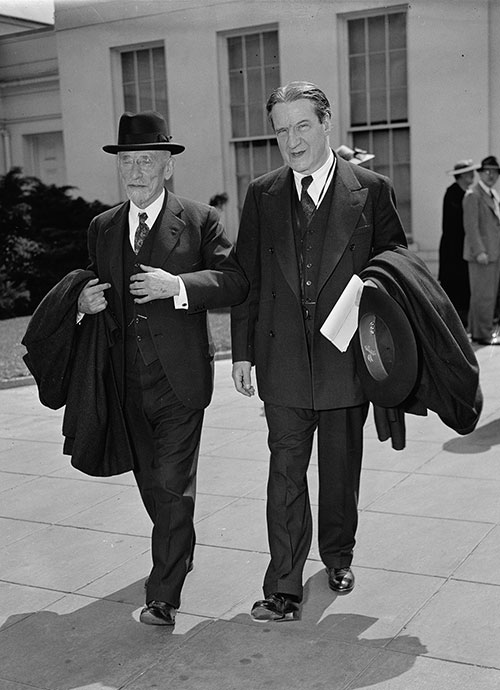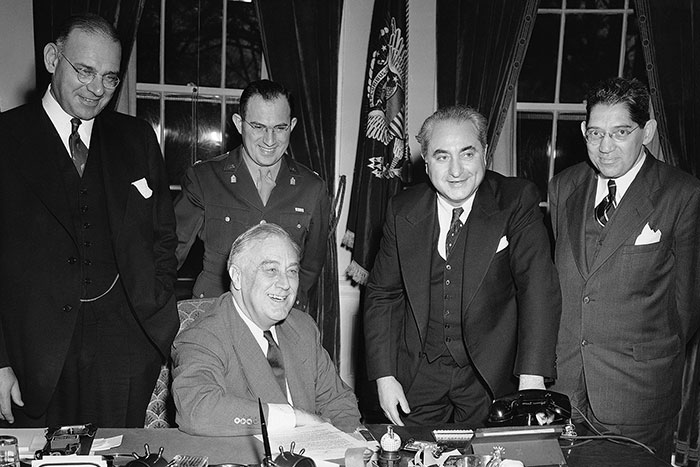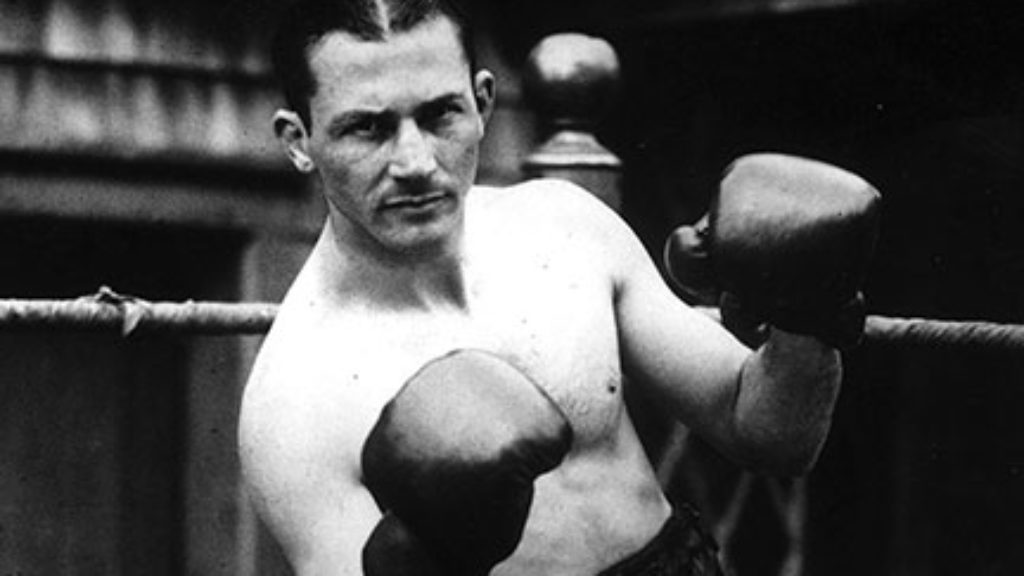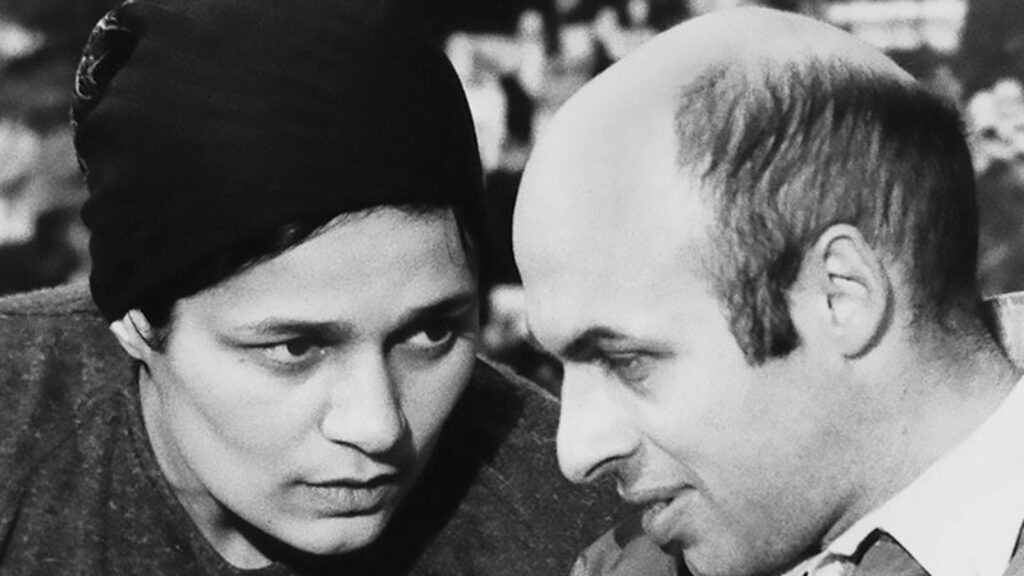Faith in Princes
“The Jews,” Arthur Hertzberg wrote, “loved Franklin Delano Roosevelt with singular and unparalleled passion.” In 1932, 82 percent of the Jewish vote went to Roosevelt, while only 18 percent went to Herbert Hoover. In 1936, FDR received 85 percent of the Jewish vote. In the elections of 1940 and 1944, fully 90 percent of American Jews voted for Roosevelt, the largest Jewish vote for a president in American history. But did FDR reciprocate this love?
To be sure, during his 12 years in the White House, Roosevelt appointed more Jews to public office than had all previous presidents combined, although only one, Secretary of the Treasury Henry Morgenthau Jr., was a member of his cabinet. Roosevelt also consulted closely with Justices Louis D. Brandeis and Felix Frankfurter (whom he appointed to the Supreme Court) and many other prominent Jews in and out of government, including Rabbi Stephen S. Wise, who was the most powerful figure in Jewish institutional life. Certainly, both American Jews and antisemites of the time believed Roosevelt to have been a philosemite. And yet, there have always been questions as to why the Roosevelt administration restricted the immigration of Jewish refugees in the 1930s, repeatedly tamped down the news of the unfolding Holocaust in the 1940s, and declined to bomb Auschwitz or the railway tracks leading to it near the end of the war.

In his damning new book, Rafael Medoff shows that Roosevelt and immediate members of his family held antisemitic views and often made casually antisemitic remarks and jokes. This is hardly a surprising fact about an early 20th-century patrician WASP like FDR, whose mother delighted in the purity of her family’s pedigree. (“At least a dozen lines of Mayflower descent converged in Franklin, and Sara could name every one of them,” a biographer wrote.) However, Medoff draws a direct line between Roosevelt’s apparent personal prejudice and his administration’s repeated failure to do more for the Jews of Europe. Almost as controversially, he indicts Rabbi Wise, the Jewish leader closest to President Roosevelt, as a gullible apologist for presidential inaction.
These are not new arguments for Medoff. He has written a series of historical polemics over the years that have criticized the Roosevelt administration and Rabbi Wise and championed the activists led by Peter Bergson (the pseudonym of Hillel Kook), who agitated for the administration to do more for European Jewry by staging demonstrations, taking out newspaper ads, and putting on shows with titles such as We Will Never Die. (It was these Jews whom both Rabbi Wise and President Roosevelt wished would, in the words of Medoff’s title, “keep quiet.”)
Aside from new material (some of it archival, much of it troubling) and a tight, almost prosecutorial, focus on President Roosevelt and Rabbi Wise, one thing that is new in Medoff’s latest book is the comparison of FDR’s attitude toward Jews with his attitude toward Japanese Americans. In both cases, Medoff argues, private prejudice led to prejudicial public policy.
Medoff acknowledges that there were many “political, diplomatic, and strategic calculations” that would have made it difficult for the president to increase immigration in the face of nativist opposition or to pressure the British to open Palestine to Jewish refugees. However, he argues that:
these factors do not . . . resolve the central mystery of Franklin Roosevelt’s response to the Holocaust. During FDR’s years in office, 1933–45, immigration to the United States was governed by a quota system that severely limited the admission of refugees. . . . Yet despite these legal limitations, nearly 200,000 more Jews could have entered under the existing law than actually did. . . . In large part this was because the officials responsible for implementing the existing immigration law quietly went beyond the law, with the president’s knowledge and approval.
The most notorious of these officials, Assistant Secretary of State Breckinridge Long, regularly briefed the president and wrote in his diary that FDR was “100% in accord with my ideas.”
In the infamous 1939 case of the ship St. Louis, which carried 907 German Jewish passengers, it was Long’s superior, Secretary of State Cordell Hull, who rebuffed Morgenthau’s suggestion that the Jewish refugees be allowed to disembark in the US Virgin Islands as tourists. Despite public pressure, widespread sympathy, and a heartrending telegram to the White House (“more than 400 [of us] are women and children”), the response of FDR’s administration, Medoff writes, “came in the form of a Coast Guard cutter, which trailed the St. Louis to ensure it did not come closer to America’s shore.” Why did Roosevelt countenance such attitudes and actions? And why didn’t Rabbi Wise speak up more often and more loudly?
Put simply, Medoff’s solution to the first question, “the central mystery,” is that, though Roosevelt was comfortable with individual Jews, he had held antisemitic attitudes from childhood and was comfortable with exclusionary antisemitic policies as president. Medoff includes several antisemitic remarks FDR made before he became president and quotes his grandson Curtis as saying that he “‘recalled hearing the President tell mildly antisemitic stories in the White House’ in which the protagonists were always Lower East Side Jews with heavy accents.” More tellingly, Medoff cites an interview FDR gave to the Brooklyn Eagle in 1920, when he was the Democratic vice-presidential candidate, about New York’s immigrant population:
They have crowded into one district and they have brought congestion and racial prejudices to our large cities. The result is that they do not easily conform to the manners and the customs and the requirements of their new home. Now, the remedy for this should be the distribution of aliens in various parts of the country. If we had the greater part of the foreign population of the City of New York distributed to different localities upstate we should have a far better condition.
The implication that the Jews against whom prejudice was directed were the ones who “brought . . . racial prejudices to our large cities” would find its echo in FDR’s suggestion to Rabbi Wise in 1938 that, to some extent, Polish Jews incited the hatred against them through their domination of the economy.

As Medoff shows, FDR’s attitude toward Japanese American immigrants in the west was similar to his attitude to Jewish immigrants in the east. “Californians,” FDR said in an April 1925 Daily Telegraph column, “have properly objected [to Japanese immigration] on the sound basic ground that Japanese immigrants are not capable of assimilation into the American population.” This, together with his distaste for “the mingling of Asiatic blood with European or American blood,” casts harsh light on another aspect of his wartime policy: the Japanese internment camps. (In 1939, Roosevelt would boast with a fellow politician of having “no Jewish blood.”)
Many of the remarks Medoff cites were made before Roosevelt became president, but among the most shocking is a quip he made to Stalin in 1945 at the famous Yalta Conference:
When FDR mentioned to Stalin that he would soon be seeing Saudi Arabian leader Ibn Saud, Stalin asked if he intended to make any concessions to the king. “The President replied,” according to the transcript, that “there was only one concession he thought he might offer and that was to give him the six million Jews in the United States.”
In an endnote, Medoff says that in later years, the State Department tried to suppress the remark, but his description of the follow-up to FDR’s crack is even more cringe inducing:
Charles Bohlen, the State Department translator . . . added a postscript . . . in the unpublished first draft of his memoir. After Roosevelt’s meeting with the king of Saudi Arabia, Bohlen said to the president: “If you put any more kikes in Palestine, he is going to kill them.” According to Bohlen, “Roosevelt laughed” at that statement.
This conversation happened, of course, after the wholesale murder of European Jewry, of which Roosevelt and Stalin were both aware. Roosevelt would pass away just months later, but he seemed to have been comfortable with such banter and—at least according to Medoff—the attitudes that underlay it for his entire life.
During his career of more than 55 years, Rabbi Wise occupied a unique place in American Jewish public life. Few 20th-century Jewish leaders have been as influential or controversial as Wise, whose public career stretched from the late 1890s, when he attended the Second Zionist Congress in Vienna and helped found the Federation of American Zionists (a forerunner of the Zionist Organization of America, or ZOA), to 1948 and the establishment of the State of Israel. In an era that produced many extraordinary figures in the American rabbinate, Wise was perhaps the most charismatic and beloved of them all. Moreover, his influence in American Jewish life far transcended the walls of the Free Synagogue he had founded, which met weekly to crowds of several thousands in New York City’s Carnegie Hall. As the founder and longtime president of both the American Jewish Congress and the World Jewish Congress and as president of the ZOA, Wise had American Jewry’s biggest pulpit.
As Medoff writes, “Rabbi Stephen S. Wise was arguably the Jewish public figure best positioned to lead American Jewry in responding to the crisis of German Jewry under Nazism.” It was Wise’s longtime friendship with FDR “that would cement his status” as the Jewish leader closest to the White House. But it was also this relationship, of which Wise was incredibly proud—he liked to refer to FDR as the “Boss” or “Chief”—that hampered his initially vigorous efforts on behalf of European Jewry. Presidential gestures such as “calling Wise by his first name, extending a dinner invitation to Wise’s daughter,” and arranging an occasional private meeting with Wise in the Oval Office, writes Medoff, “made Wise feel as if he had the ear of the president” and helped ensure “that Wise would keep his negative feelings about Roosevelt’s refugee policy to himself.”
One of the many examples Medoff brings of how this dynamic played out is the fate of the 1939 Wagner-Rogers Bill. In early 1939, Senator Robert Wagner and Congresswoman Edith Rogers introduced legislation to admit 20,000 German Jewish children to the United States. Their bill was supported by clergy, labor leaders, university presidents, movie stars, and political leaders such as Herbert Hoover and former Republican presidential candidate Alf Landon. Several patriotic and nativist groups, including the American Legion and Daughters of the American Revolution, mobilized opposition to the bill. Laura Delano Houghteling, an antisemitic cousin of President Roosevelt and the wife of the US commissioner of immigration, gave voice to the opposition when she complained that “20,000 charming children would all too soon grow up into 20,000 ugly adults.” Four days of hearings were held, during which President Roosevelt adamantly refused to support the bill, and it died in committee. Although Wise supported the bill, he did so in silence, never even privately lobbying legislators or pressuring President Roosevelt. When the lives of several thousand British children were threatened the following year by German bombing raids, Medoff notes, Roosevelt and Congress pushed through emergency legislation to bring them to the United States.
One of the most telling episodes that Medoff recounts is of Rabbi Wise’s reception of the news from Europe that the Nazis were planning mass murder. On August 8, 1942, Gerhart Riegner, a representative of the World Jewish Congress, showed up at the American embassy in Geneva with a message to cable to the Allied leaders and Rabbi Wise:
Received alarming report stating that, in the Fuehrer’s Headquarters, a plan has been discussed, and is under consideration, according to which all Jews in countries occupied or controlled by Germany numbering 3½ to 4 million should, after deportation and concentration in the East, be at one blow exterminated. . . . Action is reported to be planned for the autumn. Ways of execution are still being discussed including the use of prussic acid.
The State Department decided not to show it to Rabbi Wise. However, the department didn’t know that Riegner had also sent it to the British Foreign Office, which showed it to Sydney Silverman, a Jewish member of Parliament, and eventually gave Silverman permission to share it with Wise. Rabbi Wise finally received the cable on August 25, 1942. A week after discussing the devastating telegram with colleagues, he telephoned Undersecretary of State Sumner Welles to ask if Welles could verify Riegner’s claims. Welles did not tell Wise that he had read the cable three weeks before, but he did promise to get back to Wise the next day. When Welles called back, he told Rabbi Wise that Nazis were still rounding up Jews only “in connection with war work” and asked Wise not to publicize the cable.
But the next day, another cable came from Switzerland with essentially the same news, this time to Rabbi Jacob Rosenheim, president of Agudath Israel. Rabbi Rosenheim relayed the telegram to Rabbi Wise, the White House, and others. Wise turned to Justice Frankfurter for guidance as to “whether the Chief ought to know about it,” though presumably FDR already did. Meanwhile, Wise kept his promise to Undersecretary Welles not to publicize the horrific news until Welles belatedly verified it on November 24, 1942. When Rabbi Wise finally went public, the State Department undercut him and “did its best,” in Medoff’s words, “to sow seeds of doubt.” The New York Times buried the news of Wise’s press conference. When Rabbi Wise led a delegation of Jewish leaders to meet with FDR the following month, the president said he was “very well acquainted” with the facts but promised no change in policy.
Over the following years, Wise would harshly criticize and even try to suppress dissidents in the Jewish community who urged a more assertive approach. He was especially incensed by the efforts of Peter Bergson and his Bergson group, who placed hundreds of full-page ads in newspapers, lobbied members of Congress, and organized a march of four hundred rabbis in Washington, DC. Certainly, these activities upset the president and his administration. When, on October 6, 1943, President Roosevelt read the group’s full-page ad in the Washington Post decrying the fact that “nothing has been done by the Allied governments to stop the slaughter or to alleviate the torments of five million people,” he was so provoked that “he used language . . . which would have pleased Hitler himself,” according to his speechwriter, Samuel Rosenman. For his part, Wise was not above comparing Bergson himself to Hitler and told his family that if he were ever found dead in an alley, they would know who did it. In 1944, Wise’s closest colleague, Nahum Goldmann, president of the World Jewish Congress, tried to convince Roosevelt administration officials to have Bergson deported or drafted. He was not, but an FBI investigation was opened, and the IRS audited the Bergson group.
The Jews Should Keep Quiet is the culmination of more than three decades of research, and it is devastating. Few readers will come away from Rafael Medoff’s book without their view of FDR having been significantly changed. However, Medoff’s historical judgment of Rabbi Wise is, it seems to me, too harsh.
It is indisputable that Stephen S. Wise placed too much trust in the unsubstantiated good intentions of Franklin D. Roosevelt. Even some of his closest colleagues saw this. Looking back, Nahum Goldmann wrote the following:
There is something [to the argument] that Rabbi Wise was too close to Roosevelt to be effective. . . . No question. And [Wise] was so attached to him and they were buddy-buddy.
Perhaps Wise’s greatest failure was in ignoring the biblical advice of his Republican archrival Rabbi Abba Hillel Silver to “put not your faith in princes.” And yet, as a historian, Medoff too often ignores the important fact that Wise lacked the political power to convince Roosevelt to do more. He acted like a supplicant, or even a “court Jew,” because that was the position in which he found himself. Moreover, in addition to his private talks with President Roosevelt and officials in his administration, Wise did organize mass meetings, public protests, and boycotts, and he did frequently and publicly call for a more liberal immigration policy, as Medoff acknowledges. Yet, despite his supposed political clout, these appeals had little effect. That Wise was guilty of errors of judgment is certain, especially in his naive trust of Franklin D. Roosevelt, but the political realities of those years foreclosed many of the options that Wise’s most vociferous critics thought he should take. Nor is it clear that American policy would have been significantly different even if he had taken them.
Franklin Delano Roosevelt, too, was a historical actor operating under the constraints of his time and place, but he was also the president of the United States, indeed the most powerful and popular president in history. And yet, as Rafael Medoff shows in this sobering book, he clearly could have done more to save European Jewry.
Comments
You must log in to comment Log In
Suggested Reading

Jewish Pugs
A successful Jewish jock, demonstrating strength and physical courage, nicely rounds out Jews’ sense of completeness as human beings.

Yo’s Blues
For Israeli artist Yoram Kaniuk, the bohemian world of Billie Holiday, Marlon Brando, and James Agee had a lot to offer, but not enough.

Sephardi Soap
With the runaway success of the novel The Beauty Queen of Jerusalem, a television adaptation was all but inevitable, and the decision of Yes Studios to invest record amounts of cash in the show, while eyebrow raising, is also unsurprising.

Sharansky’s Exodus
Witnessing the modern exodus of Jews from Ethiopia to Israel—different than his own but no less stirring—reminded Sharansky of what he’d told himself in his darkest days in prison: “Your history did not begin with your birth or with the birth of the Soviet regime. You are continuing an exodus that began in Egypt. History is with you.”
gershon hepner
HOW ANTI-JEWISH PREJUDICE MAY BE PROTECTED
Twenty thousand charming children would grow into twenty
thousand ugly adults, declared Laura Delano Houghteling,
Franklin Delano Roosevelt’s cousin, who thought more than plenty
would be a single Jewish refugee from Hitler. Such short selling
of Jews reflected views of FDR, his prejudice protected
by a very prominent Reform rabbi, Stephen S. Wise.
Progressive anti-Jew practitioners today are not suspected
of being anti-Jewish, anti-Zionist Jews their strong allies,
as was the case with Roosevelt the leader of a party
that then as now had the support of a majority of Jews,
and nowadays has many members who with Zionists won’t party,
but deny that such behavior reflects anti-Jewish views.